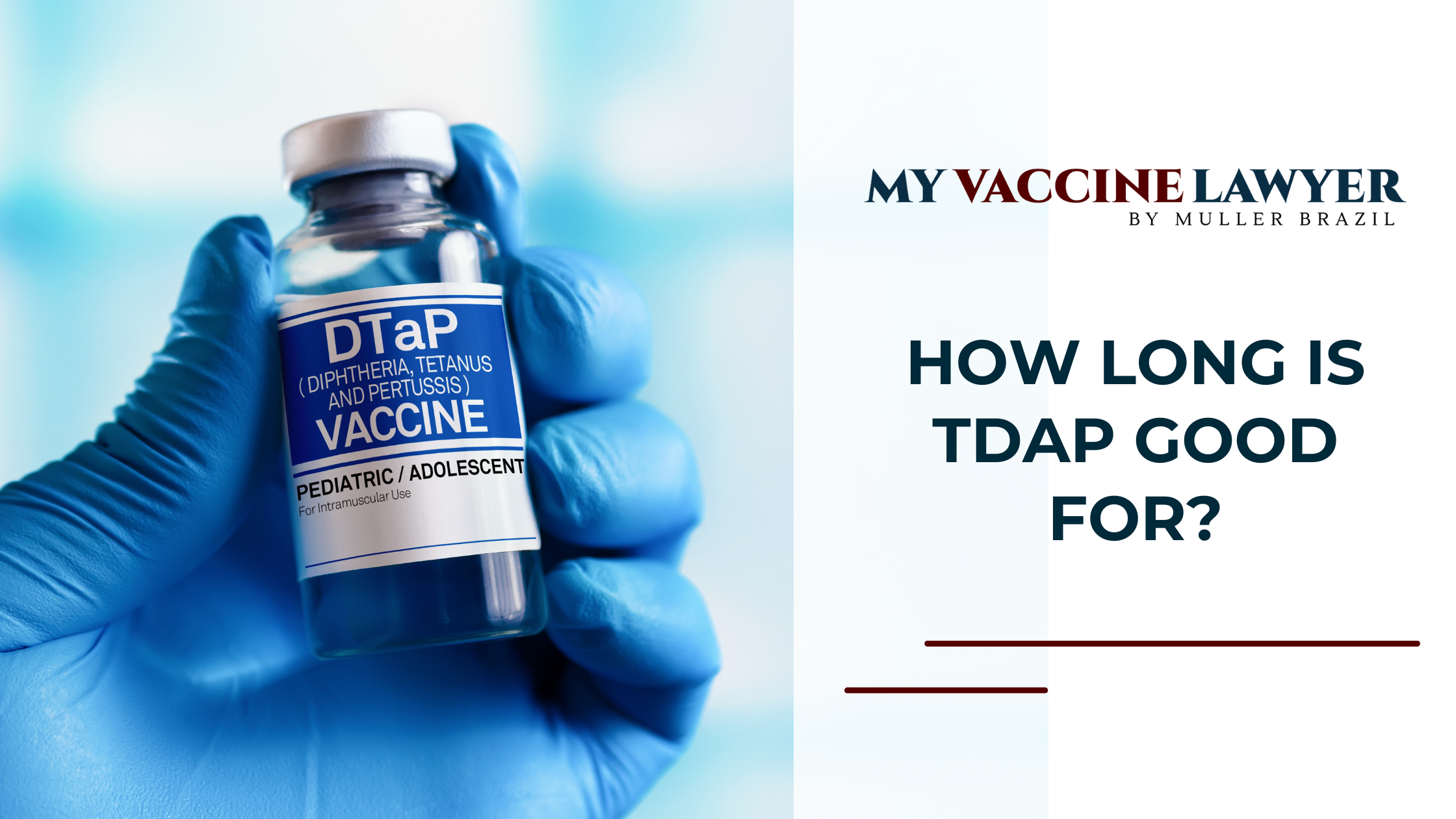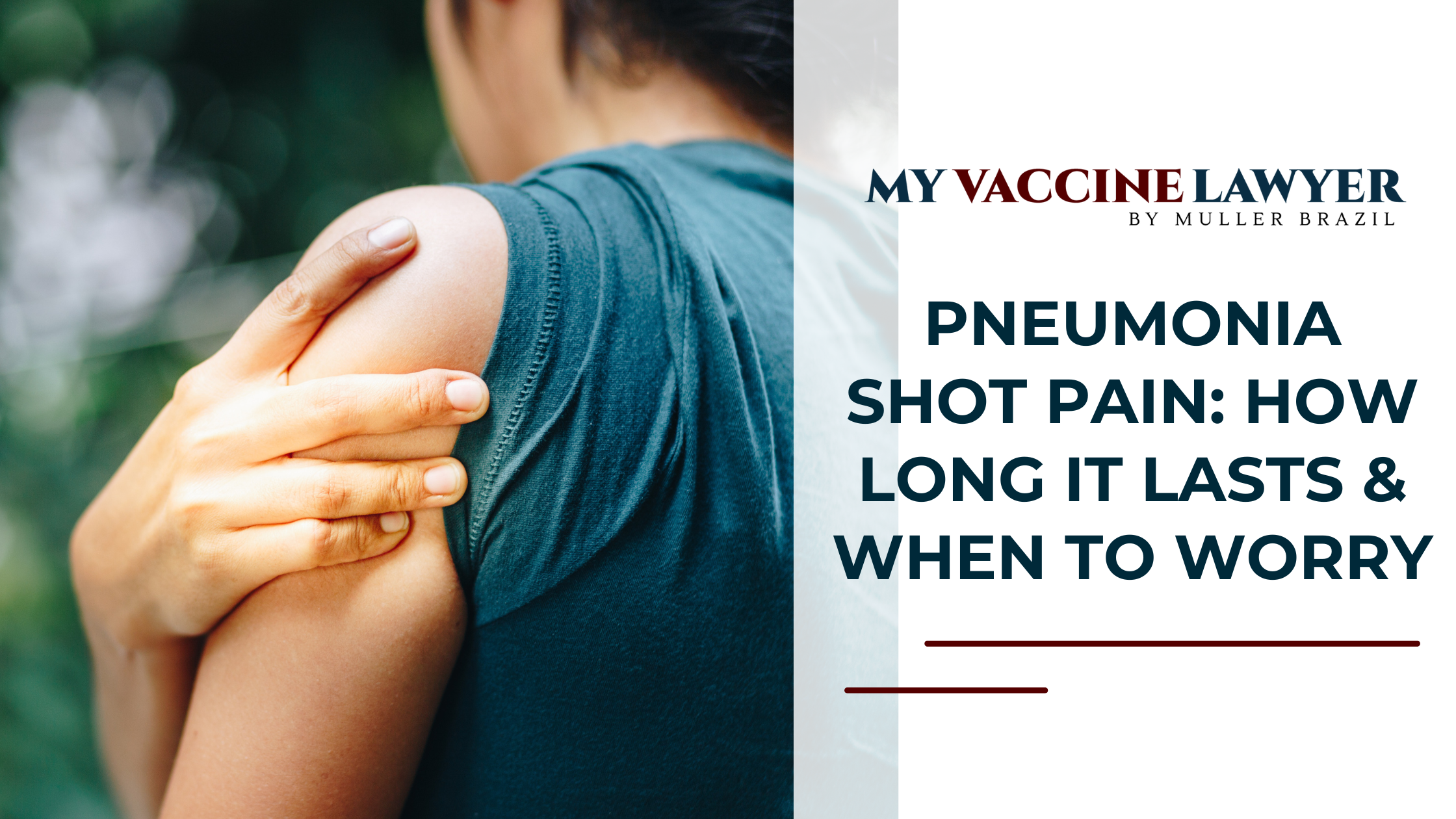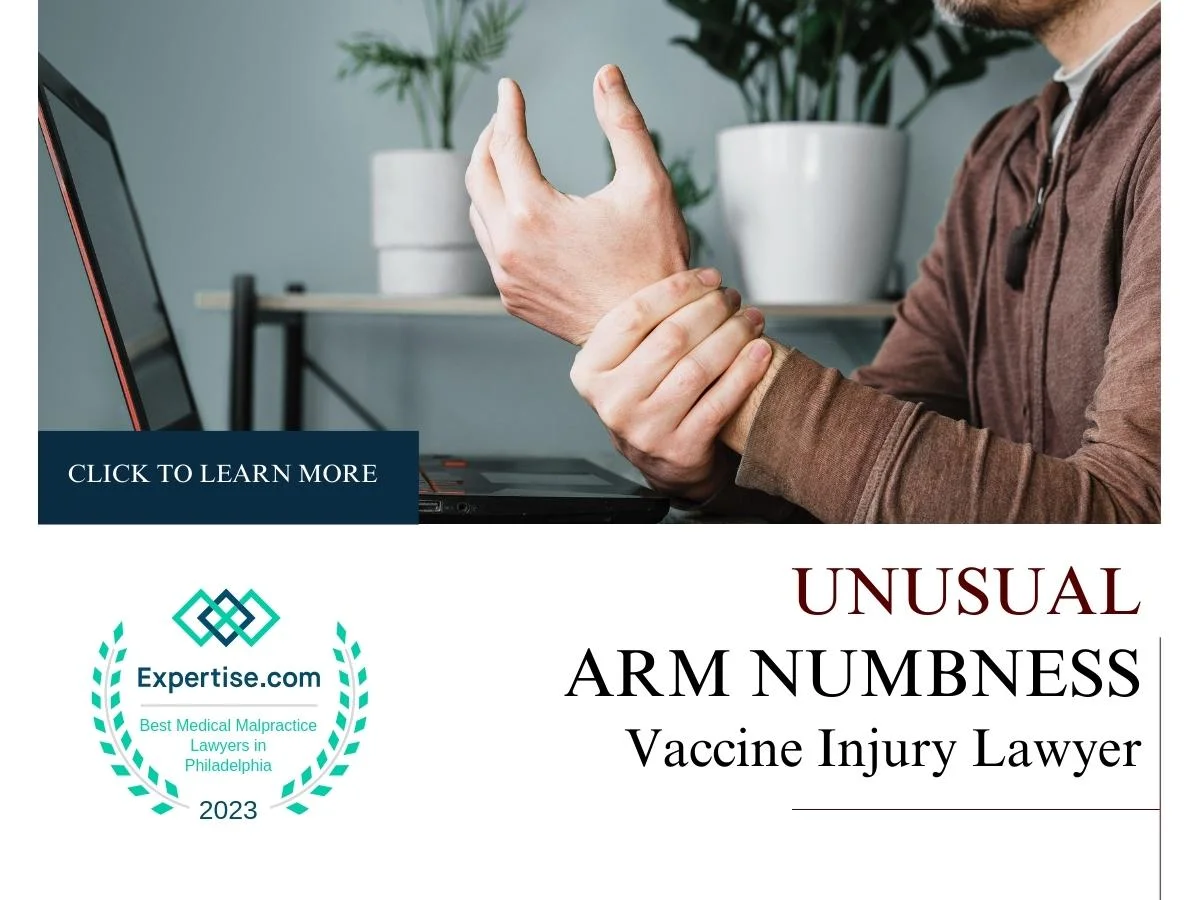How Long is Tdap Good For?
Vaccines have a powerful role in protecting against dangerous diseases, especially for older adults and individuals at high risk.
5 min read
Vaccine Injury Law Resources / Paul Brazil / Arm Numbness After a Vaccine: Causes & When to Seek Help
 Paul Brazil
:
Jun 9, 2023 8:00:00 AM
Paul Brazil
:
Jun 9, 2023 8:00:00 AM
While mild soreness is expected after a vaccine, persistent arm numbness may indicate nerve irritation or an immune reaction.
Have you ever felt tingling, weakness, or numbness in your arm after receiving a vaccine? While most people expect mild soreness at the injection site, some experience a lingering sensation that doesn’t seem to go away. Arm numbness after vaccination can be caused by nerve irritation, inflammation, or even immune system responses. In most cases, the symptoms are temporary, but for some, neuropathic symptoms like tingling or muscle weakness can last longer and interfere with daily life. Understanding why this happens is important - whether you’re dealing with mild discomfort or more serious symptoms, knowing the potential causes can help you determine the best next steps.
Several factors can contribute to arm numbness after vaccination, including:
Peripheral nerve irritation or damage – The needle may irritate or impact peripheral nerves, leading to temporary numbness, tingling, or muscle weakness.
Inflammatory response – Some individuals experience an immune system reaction that causes swelling, putting pressure on nearby nerves.
Brachial neuritis – This condition affects the nerves in the upper arm and shoulder, leading to neuropathic symptoms such as shoulder pain, weakness, and numbness.
Autoimmune reactions – In some cases, vaccines may trigger an autoimmune reaction affecting the peripheral nervous system, leading to persistent nerve damage.
Guillain-Barré syndrome (GBS) – A serious disorder that can develop after vaccination, GBS affects the spinal cord and peripheral nerves, leading to progressive muscle weakness and mobility issues.
While most vaccines are safe and well-tolerated, some have been more commonly associated with nerve-related side effects, including arm numbness, tingling, and muscle weakness:
Flu Vaccine – Some individuals experience neuropathic symptoms like numbness and weakness after receiving the flu shot, possibly due to an immune system reaction or inflammation around the peripheral nerves.
COVID-19 Vaccine – Reports have linked the Moderna and Pfizer coronavirus disease vaccines to nerve injuries, including brachial neuritis and ulnar nerve irritation. These cases are rare, but they highlight a potential causal relationship between the vaccine and nerve complications.
Other Vaccines – Vaccines for hepatitis, tetanus, and HPV have been associated with rare neurological complications, such as Bell’s palsy, Parsonage-Turner syndrome, and Guillain-Barré syndrome (GBS).
Arm numbness after vaccination is considered a rare condition, but it does occur. Some important factors that may increase the risk include:
Pre-existing nerve conditions – Individuals with a history of peripheral neuropathy or nerve injuries may be more likely to experience vaccine-related neuropathic symptoms.
Injection technique – If a vaccine is administered too high or too deep into the muscle, it may put pressure on peripheral nerves, leading to weakness, numbness, or tingling.
Autoimmune disorders – Those with autoimmune conditions may be more susceptible to vaccine-related neurological complications, as the immune response can sometimes trigger inflammation in the peripheral nervous system.
Most people experience only mild side effects after vaccination, but if you notice persistent or worsening symptoms, it could indicate a more serious issue. Watch for:
Tingling or numbness in the arm, hand, or fingers
Muscle weakness or difficulty moving the arm
Shoulder pain or a deep, aching sensation
Swelling or inflammation at the injection site
Loss of grip strength or coordination in the hand
Pain that radiates from the shoulder down to the hand
If your arm numbness lasts more than a few weeks, worsens, or affects daily life, you may be dealing with a more serious vaccine-related nerve injury. Seeking medical attention is necessary to document your condition and explore treatment options. In some cases, vaccine-related nerve damage qualifies for compensation through the Vaccine Injury Compensation Program (VICP), a federal program that provides financial relief to individuals suffering from vaccine injuries.
To determine if you may have a claim, consider:
How long symptoms have lasted – Temporary numbness is common, but prolonged weakness, tingling, or pain could indicate nerve damage.
The impact on daily life – If your symptoms affect work, mobility, or quality of life, you may have grounds for compensation.
Medical diagnosis – If a doctor links your symptoms to the vaccine, this strengthens your case under VICP.
While most vaccine-related side effects resolve on their own, some individuals experience long-term nerve damage that affects their daily life. If your arm numbness persists, worsens, or impacts your ability to work or function normally, you may be eligible for compensation.
You should consider contacting a lawyer if:
Your symptoms last for weeks or months with no improvement
You’ve been diagnosed with a nerve-related condition linked to vaccination, such as brachial neuritis, Guillain-Barré syndrome, or Parsonage-Turner syndrome
Your symptoms affect your daily life, work, or mobility
You have medical bills, lost wages, or ongoing treatment expenses
Filing a VICP claim can be complicated, and strict deadlines apply. If you believe your vaccine-related arm numbness qualifies for compensation, speaking with an experienced vaccine injury attorney can help you determine the best course of action.
Persistent arm numbness after vaccination isn’t something to ignore. While many cases resolve on their own, long-term symptoms could indicate a serious nerve condition. If your symptoms are lasting for weeks, worsening, or affecting your ability to work or function, it’s important to seek medical attention and understand your options. If a vaccine-related nerve injury is impacting your daily life, you may be eligible for compensation through the Vaccine Injury Compensation Program (VICP). Understanding the claims process can be stressful, but you don’t have to go through it alone.
My Vaccine Lawyer helps individuals who have suffered vaccine-related injuries determine their legal options and fight for the compensation they are entitled to. If you’re experiencing ongoing arm numbness, reach out today to see how we can help.
If numbness lasts more than a few days, worsens, or is accompanied by muscle weakness or pain, consult a healthcare professional to rule out nerve damage.
Mild arm pain after a vaccine is normal, but if the pain spreads, becomes severe, or affects your ability to move your arm, it could be a sign of nerve injury.
Yes, if the needle is placed too high or too deep, vaccine administration can impact nerves, leading to prolonged numbness or weakness.
Yes, physical therapy can improve mobility, strengthen muscles, and reduce pain associated with nerve injuries from vaccines.
If your symptoms last for weeks or months and affect your daily life, you may qualify for a VICP claim. Speaking with a vaccine injury lawyer can help determine your options.
Yes, elderly patients may be more susceptible to vaccine-related nerve injuries due to age-related nerve sensitivity and slower recovery times.
While the flu vaccine is generally safe, some individuals experience neuropathic symptoms like numbness, tingling, or weakness due to an immune system response or nerve irritation from the injection.
Paul Brazil is a native of Dunmore, Pennsylvania and a graduate of Dunmore High School. For his undergraduate education, he attended Bloomsburg University where he majored in political science. He then went on to earn his JD from Widener University School of Law. Following graduation from law school, Mr. Brazil worked at a large Philadelphia civil defense firm where he litigated workers’ compensation claims and Heart and Lung Act cases. In 2012, he joined with his coworker Max Muller to form Muller Brazil.

Vaccines have a powerful role in protecting against dangerous diseases, especially for older adults and individuals at high risk.

If you experience shoulder pain after a vaccination, you might have a Shoulder Injury Related to Vaccine Administration (SIRVA). Exercises like the...

Getting a vaccine is a routine part of staying healthy, but that doesn’t mean it’s always comfortable. If you've recently received a pneumonia shot,...
